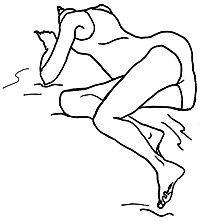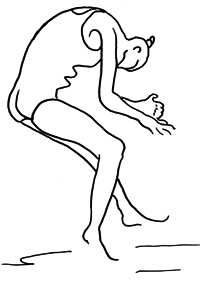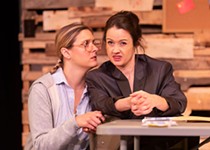Exhibitionism
Big River: Pleasantly Adrift
Fri., July 30, 1999
through August 15
Running time: 2 hrs, 45 min
"Persons attempting to find a plot will be shot by order of the author, Mark Twain." This tongue-in-cheek warning in the playbill for this year's Zilker Theatre Productions summer musical suggests that in place of a strong narrative, audiences should sit back as the sun sets and soak up the good feelings of the ensuing musical numbers, large and small, while relishing the tidbits of Twain's well-known story of the adventures of Huckleberry Finn. There is a plot to the evening's lengthy production, and it is submerged, albeit by some excellent distractions: booming voices, lovely duets, and a gifted chorus; a whole town's worth of bodies peopling the stage; spry antics and derring-do with a comic flair; Robert T. Whyburn's gorgeous, moody lights; and the hypnotic effect of a raft drifting down the big river to magical points unknown.
Director Rod Caspers moves this production along with the solidity and confidence of so much mighty water. In Virdell Williams Jr., cast as the escaping slave Jim, the musical has an actor whose voice soars into the Austin sky. Mike Bradecich is an amiable Huck, also possessed of a fine voice, piloting his story down the dreamy waters of the Mississippi. Nicholas Rodriguez is sidekick Tom Sawyer, who takes a backseat in the story, but provides exuberant, youthful energy whenever he is onstage. Scott Schroeder is a delightfully bombastic humbug as the King, and his sidekick Huck Huckaby (yes, that's his real name!) portrays the devious, rubber band-like con man/actor the Duke with zeal. It's a boy's story, though none of the actors is all that young; the women, with the soulful exception of the female chorus, are largely passive, quiet.
With families corralled on blankets, this is an easygoing tale: a true summer musical treat, lounging under the stars as if on one's own raft, adrift. The production suffers from the Zilker musical's typical weakness of uneven performances among so large a cast, but, drifting along from one scene to the next, no minor character is onstage long enough to capsize the whimsical adventure underway. This sense of endless drifting does lead to a sleepy feeling, especially as the evening stretches on to nearly three hours in length. So much of the middle of the story concerns the two scalawags, the King and the Duke, who are drifters of another sort, but these two are not nearly as much fun as Huck, Jim, Tom, and the boys -- they have only one thing in mind: the con -- which adds to the feeling of length. And why, in this Capital of Live Music, do the body microphones never seem to work properly? Scott Schroeder's gruff voice crackled across the hillside often unintelligibly on the night this reviewer attended -- a pity, since his performance was clearly so sharp. The women were sometimes inaudible, compared to the men. And families with young children be warned, there is an awful lot of talk of Hell early on, in a school-marmish number titled, "Do You Wanna Go to Heaven."
When in song, this musical proves itself full of life and energy. Roger Miller's lyrics and music are a perfect fit for this fitful story; choreographers Acia Gray and Dierdre Strand turn Miller's tunes into galloping fun, with the townsfolk dancing, chiding, and generally enjoying life on the river. When the company gets to the big numbers, like "Muddy Water" or the wild "Hand for the Hog," it's as rousing and fun as all get-out. And those languid, soulful songs, like "The Crossing" and "Free at Last" should linger on well after the kiddies are back in their beds.
-- Robi Polgar
ELLEN BARTEL: ASCENSION/DESCEND: SPELLBINDING JOURNEY THROUGH TIME
Four Austin coffeehouses,
|
|
July 19-22
In the spirit of Doris Humphrey's 1931 solo "Two Ecstatic Themes," which explored the spectrum of possibilities between fall and recovery, Ellen Bartel presented her own version of the relationship between ascending and descending. The 30-minute solo, performed at four different locations throughout the week, was deceptively simple. One dancer, one violinist (Tara James), both clad in black with skin painted gold. The dance progressed from sitting to standing to walking to turning to lunging to lowering to stillness -- all very, very slowly and deliberately. It seems that once a movement is suspended in time and momentum is denied, complexities and complications arise. Have you ever tried to walk really slowly and realized how difficult it is to maintain your balance? If you continue moving slowly, issues such as muscle fatigue begin to surface and your awareness shifts to the pattern of your breathing and how many times you have blinked in the past few minutes. Perhaps you will move into a contemplative state, perhaps you will not. But it is widely recognized that the impact of the moment-by-moment experience will teach you something about yourself.
|
|
In many cases, the dancing in a performance happens so quickly that you might feel anxious about missing something if you blink or look away. The focus of Bartel's piece was the space between start and finish, a concept as intricate as the person who experiences the work. I enjoyed not only the execution of the piece, but the rippling effect of linkages I have discovered upon further reflection. -- Dawn Davis
MACHINAL: REPRESSION IN BLUE
The Vortex,
through July 31
Running Time: 1 hr, 40 min
To live in a world of prison bars. Everywhere you look, your gaze is met by row upon row of rigid, unyielding lines. They're in the walls, in the shelves, in the shutters and blinds that cover the windows. They're in the backs of the chairs you sit in, in the desks where you work, in the papers you shuffle, in the clothes the people around you wear. Lines, lines, lines -- blocking your view, falling across your face as shadows, confronting you, confining you as tightly as the bars of any jail.
That's the view of the world we're given in the VORTEX Summer Youth Theatre production of Sophie Treadwell's Machinal. Dominating Anne Marie Gordon's set are tall, boxy installations in which are embedded assorted objects -- high-heeled shoes, a doll, a camera, frames, shutters -- many of them distinguished by crisp, straight lines. Her other scenic elements, such as the blinds that cover the set's lone window, are likewise thick with lines, and they crop up in Kari Perkins' costumes and in C.J. Swinburn's aquatic lighting, where strips of noirish shadow cut across pools of unsettling blue. Once you tune into them, the lines become so prevalent as to be oppressive, so, even before the heroine of this feminist tragedy makes her first entrance, we can relate to the constraints she feels, the suffocating sense of captivity.
Seeing this young woman's environment through her eyes, feeling how onerous it is, heightens our sense of horror as her tragic tale is played out. Though we can see where the story is headed, guess the fate of the young woman, from the opening episode -- an office scene bubbling ominously with repetitious office activity, glib workplace platitudes, and catty employee chatter -- watching the protagonist's inevitable descent into madness and murder can still be compelling if some part of us feels that pressure, sees those bars.
We can here, and so it gnaws at us to see Elizabeth Doss' young woman stumble into the office wide-eyed with anxiety, tense with confusion and frustration, desperate for a freedom she cannot find; to see her back into a hollow marriage with her boss (Bill Durham, asserting his authority with smooth insistence and facile conviviality), then to find companionship with another man (the ever-reliable Matthew Patterson, giving a broad smile and an easy grace to this different drummer), only to lose it in a vision of violence that brings her no closer to the freedom she hungers for, only further into confinement. Doss adds to our unease with her committed portrait of a lost soul, her face ever open, searching, vulnerable, haunted by an unattainable dream of liberty. And we're drawn deeper into her pain by the performances around her -- especially Sarah Jacobson's lively and effusive Telephone Girl and David Saldaña's slick Second Man -- and by the pulsing, pounding electronic sound design by Chad Salvata.
Though the company is mostly teens, with a few adult guest artists filling out the cast, no effort has been made to soft-pedal Treadwell's indictment of a society that chews up and spits out its young people, especially young women. Director Heather Barfield has everyone, even the youngest actors, contributing to the show's atmosphere of grim repression with gravity and focus. The result is something we've seen in other Vortex Summer Youth Theatre productions and we applaud it: a sense of common purpose and shared spirit among the company. That can make a world of difference in the theatre, the difference between us experiencing a drama in our seats in a playhouse and experiencing it in the world where it's played out. With this version of Machinal, strong of vision and unified in performance, we experience a young woman's fall in a place awash in blue and thick with lines, with hard faces and rigid rules and machinery hemming us in. -- Robert Faires










